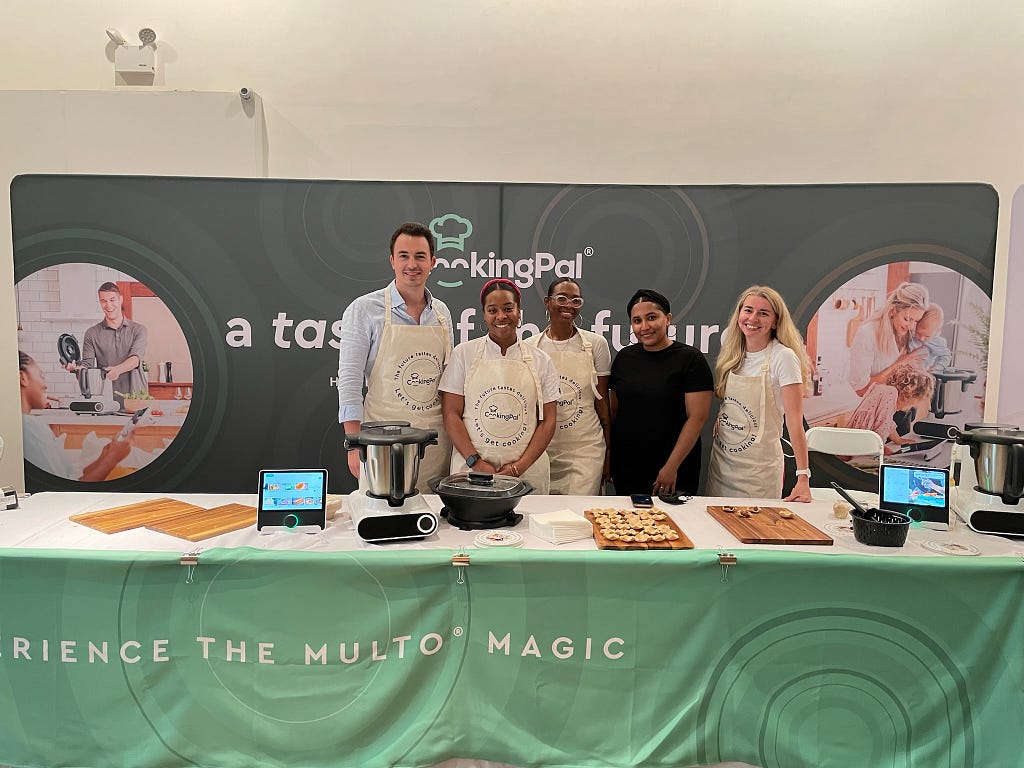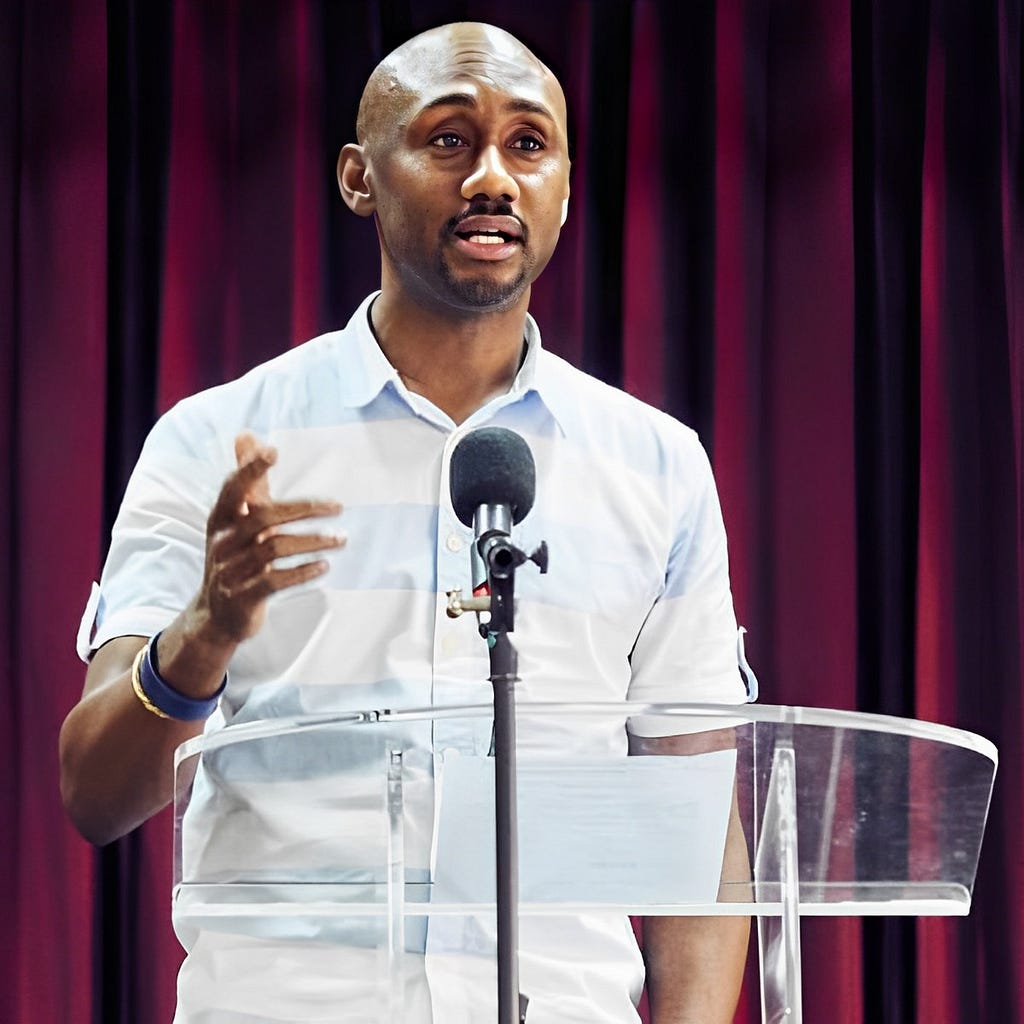The Future Is Now: Markus Buck Of CookingPal On How Their Technological Innovation Will Shake Up The Tech Scene
An Interview With Fotis Georgiadis
Don’t put on a masquerade. Admit challenges and be honest, whether personal or professional. Having a weakness is inevitable since we are humans. How a person reacts to struggles shows the true nature of that person.
As a part of our series about cutting-edge technological breakthroughs, I had the pleasure of interviewing Markus Buck.
Markus co-founded CookingPal in 2018 with a team of manufacturing veterans, with the goal of providing the most convenient home cooking experience in the market. Combining over 30 years of experience in the household appliance industry, they set out to build a holistic ecosystem of multifunctional kitchen devices to make chef-level cooking more approachable, while engaging and inspiring a growing community of home cooks.
Since launching their first product “Multo” in 2021, the team has been recognized with awards and accolades including CES Best of Innovation Award for 2020, the iF design award, and “Best all-in-one food processor” by Insider.
Thank you so much for doing this with us! Before we dive in, our readers would love to learn a bit about you. Can you tell us a story about what brought you to this specific career path?
A series of coincidences came together at once — my fascination for IoT household appliances, a personal endeavor to live a healthier lifestyle, and meeting the right people at the right moment. Growing up in a family business in Germany, my dream was to build something that made a lasting impact and that I could be proud of in the future. I love physical products that have everyday-use in people’s lives, so I created software-based features for the purpose of overcoming the frustrations of cooking, which is the perfect problem to solve. It is essential to eat, and for most, it is just a daily duty. A tasty, healthy, yet equally convenient dish is what everyone strives for. During a time of change in my life, I was seeking a constant helping hand in my kitchen and was not satisfied with the products and systems available. My friend’s network introduced me to some industry veterans, and I feel very fortunate to have found such knowledgeable and genuine partners to embark on this journey. The home appliance market is also highly competitive with many barriers to entry, I like overcoming such hurdles and challenging the establishment. Did we underestimate the task? Oh yes. Is it worth it? Most definitely! Developing a category-leading technological brand that is far more than just innovative appliances, but a sophisticated cooking assistant-like software system for the everyday cook — this is what the “Pal” in “CookingPal” stands for.
Can you share the most interesting story that happened to you since you began your career?
The past few years have been filled with so many phenomenal interactions, it is very difficult to single out an individual event. At the end of the day, the people you create those stories with are what make them interesting and memorable.
Can you tell us about the cutting-edge technological breakthroughs that you are working on? How do you think that will help people?
It’s in the name, CookingPal. We are working towards becoming your personal cook’s concierge, the “Pal” assisting you in your daily cooking routine. Whenever we are determining priorities for products and features roadmap, we do it based on the customer feedback. By integrating hardware, software, and content into one solution, we strive to provide customers with a seamless experience. Customers appreciate the ease of interacting with a single point for anything cooking-related, rather than jumping around over a scattered landscape of seemingly innovative applications. The vision we have for our systems and services is nothing that currently exists, which means it will require a lot of consumer research to help us make the right decisions. An innovation doesn’t just happen overnight, it often requires a holistic approach with many ups and downs along the way, but we are in it for a long game.
How do you think this might change the world?
If we can help to take away some of the burdens to provide a healthy meal to your loved ones and give you a seamless helping hand when cooking, then I think we are making a positive change in this world. Whether it is reducing food waste through well-developed recipes, using fewer appliances due to multifunctionality, or providing healthy, cost-effective alternatives to fast food — we might not change the world all at once, but surely one kitchen (household) at a time.
Keeping “Black Mirror” in mind, can you see any potential drawbacks of this technology that people should think more deeply about?
It is our responsibility to keep our customer interest at the center of our technology. It is in our DNA to act in the best interests of our customers and not to exploit their trust. The worst that might happen is that our culinary team suggests an alternative or improvement, based on what one had for breakfast the last few days.
Was there a “tipping point” that led you to this breakthrough? Can you tell us that story?
Highly complementary feedback was received from a customer after our culinary team uploaded a newly created recipe, which he had requested through our Hub. It’s this close connection with consumers that we love and seeing the joy they have from the work our team does gives us a lot of affirmation and inspires us for new ideas.
What do you need to lead this technology to widespread adoption?
Stamina — this isn’t a quick rally or a rocket-like wonder. As we grow and scale, we need to continue being close to our customers, we need to hear them, and improve based on what they really want. The best technology is only as good as its use case, and in our world, it is assisting the everyday cook. We will work on partnerships with food brands, content creators, and other appliance brands to create the best user cooking experience.
What have you been doing to publicize this idea? Have you been using any innovative marketing strategies?
Cooking is an art, but also a science that needs to be mastered. Our products in combination with the recipe content require a certain degree of customer education, hence we are providing cooking demonstrations and classes to all interested customers free of charge. To meet our customers’ needs, our in-house culinary team and chef partners create all our recipes. Since we are extremely hands-on, our customers are the best spokespersons for our brand. As an old saying goes: A way to one’s heart is through one’s stomach.
None of us are able to achieve success without some help along the way. Is there a particular person who you are grateful towards who helped get you to where you are? Can you share a story about that?
My highest appreciation goes to my family for the opportunities, unconditional love, and support they have provided me with. As cliché as it sounds, they have shaped my being and identity, especially my mother.
How have you used your success to bring goodness to the world?
While I believe our products bring a certain level of goodness to people’s lives, I think you’re referring to societal goodness as a whole. We are early on our journey and already have had ideas on how we can give back through programs around food security and sustainability for less fortunate groups.
Even though I donate personally to charities for endangered animal species and cultural art archive preservations, what I deem most important is to look out for one another in one’s direct surroundings. Always pay attention to those around you, not only those you are close to but those you come across on the street too. Be appreciative, respectful, and helpful to one another. The best impact can be made on your immediate surroundings.

What are your “5 Things I Wish Someone Told Me Before I Started” and why?
Don’t put on a masquerade. Admit challenges and be honest, whether personal or professional. Having a weakness is inevitable since we are humans. How a person reacts to struggles shows the true nature of that person.
Learn to say “No”. You should trust your gut feeling when it comes to setting your baseline, your values, and what and who you want to be associated with. Saying yes is easy, but saying no is hard.
Don’t forget the fun. When we’re deep into operational tasks, we can sometimes get heated over difference in opinions. We have a strong team of opinionated and driven people, and we are always having discussions. We often spend more time with our team than with our families, it is therefore essential to laugh together and enjoy each other’s company.
It’s good to trust first in a relationship. This is often a chicken and egg problem, who commits first to a relationship, and who shares some information first. It is a sign of greatness to have trust in another party first. I find it important then to communicate this also clearly up front, that you are the one going the first step.
Scale is not everything. Growing sustainably is essential and it is ok to not be the biggest but be the healthiest. Expansion needs to be supported by a solid team and organization.
You are a person of great influence. If you could inspire a movement that would bring the most amount of good to the most amount of people, what would that be? You never know what your idea can trigger. 🙂
Waste management and resourcefulness of consumption are crucial to create a sustainable future environment. Even starting small is a start and will have an impact.
Can you please give us your favorite “Life Lesson Quote”? Can you share how that was relevant to you in your life?
Work hard. Work smart. Be kind.
Kindness goes a long way in business and whether you realize it or not, everyone is in the people’s business. Whether you interact with your customers, partners, or colleagues — engage with those who make you comfortable and ensure they are treated with kindness. Everything comes back to you.
Some very well-known VCs read this column. If you had 60 seconds to make a pitch to a VC, what would you say? He or she might just see this if we tag them 🙂
CookingPal is the Apple of the kitchen. We combine innovative appliances with an open software platform and the content as well as feature applications to create the best user cooking experiences. This enables people to provide nutritious, tasty, and easy-to-cook meals for their loved ones every day.
How can our readers follow you on social media?
Best to follow us on our CookingPal social media channels on Instagram, Facebook, or YouTube.
Thank you so much for joining us. This was very inspirational.
The Future Is Now: Markus Buck Of CookingPal On How Their Technological Innovation Will Shake Up… was originally published in Authority Magazine on Medium, where people are continuing the conversation by highlighting and responding to this story.



